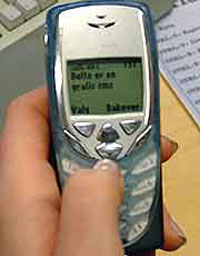|
 |
|
Britons texting St Valentine's Day love
messages should be careful they don't send them to the wrong
person. |
Britons texting St Valentine's Day love messages should be careful they
don't send them to the wrong person.
A poll of 3,000 mobile phone users that found 40 percent will be
texting rather than sending cards and that one in four have misdirected a
provocative text or photo.
Recipients of the unwanted texts include bosses or colleagues (9
percent) parents (3 percent) and perhaps most embarrassing of all --
ex-partners (2 percent).
The study for student phone service dot mobile revealed eight in ten
18-25 year olds have sent a
flirty text message within the last year, with a third
indulging in "text sex."
The survey found 60 percent of respondents had sent a flirty text to
someone other than their regular partner although not without consequences
for many of them.
Of those who admitted cheating, 65 percent had been caught out by their
mobile, with a third saying their partner had read incriminating text messages.
With loved-up texters getting ready for the big day, dot mobile has
come up with a few tips:
-- Keep flirty messages short.
-- Observe the two-day rule: get in touch after meeting someone within
two days, no longer.
-- Do not drink and text.
-- Avoid over-use of emoticons and jargon.
-- "Xs" at the end of
messages should not exceed three.
-- Be careful about picture messaging which others may get their hands on.
-- Adhere to the two text rule; Admit defeat if you have not received a
reply after 12 hours and two texts.
(Agencies)
|
情人節(jié)那天準(zhǔn)備發(fā)甜蜜短信的人要小心��,千萬(wàn)別發(fā)錯(cuò)了人����。
有3000名手機(jī)用戶參加的調(diào)查顯示�����,有40%的人在情人節(jié)這天通過發(fā)短信傳情�,而不是郵寄卡片,其中四分之一的人曾經(jīng)把帶有挑逗性的短信或照片發(fā)給錯(cuò)誤對(duì)象。
誤發(fā)對(duì)象中�,老板、同事占9%�,、父母占3%�����,最尷尬的是把短信錯(cuò)發(fā)給前任戀人�,這種情況占2%。
針對(duì)dot
mobile手機(jī)公司18歲至25歲的學(xué)生用戶的研究顯示�,80%的學(xué)生在去年發(fā)送過調(diào)情短信,其中三分之一的人發(fā)送過"色情短信"���。
研究發(fā)現(xiàn)�,盡管對(duì)許多人來(lái)說(shuō)會(huì)造成一些不好的后果�,但60%的受訪者都給非男女朋友關(guān)系的人發(fā)送過調(diào)情短信。
在那些承認(rèn)欺騙伴侶的人中���,65%被手機(jī)上的內(nèi)容被出賣���,其中三分之一的人說(shuō)伴侶看見了他們發(fā)送的"有罪"短信。
在這個(gè)重大節(jié)日來(lái)臨之前����,對(duì)于那些戀愛中的人來(lái)說(shuō)����,dot mobile公司給出如下建議:
--煽情的信息要短些�。
--遵守兩日規(guī)則:和誰(shuí)見面后最多在兩天內(nèi)聯(lián)系一下�����,不要拖延太久�。
--別邊喝酒邊發(fā)短信。
--避免過多使用表情符號(hào)或難懂的話���。
--短信結(jié)尾的"吻你"別超過三個(gè)��。
--發(fā)圖片要小心����,以免被別人弄到�����。
--堅(jiān)持"兩條短信"的原則���,如果給一個(gè)人發(fā)過兩條短信�����,但在12個(gè)小時(shí)內(nèi)沒收到回復(fù)�����,那就承認(rèn)自己發(fā)錯(cuò)了吧����。
(中國(guó)日?qǐng)?bào)網(wǎng)站編譯)
|